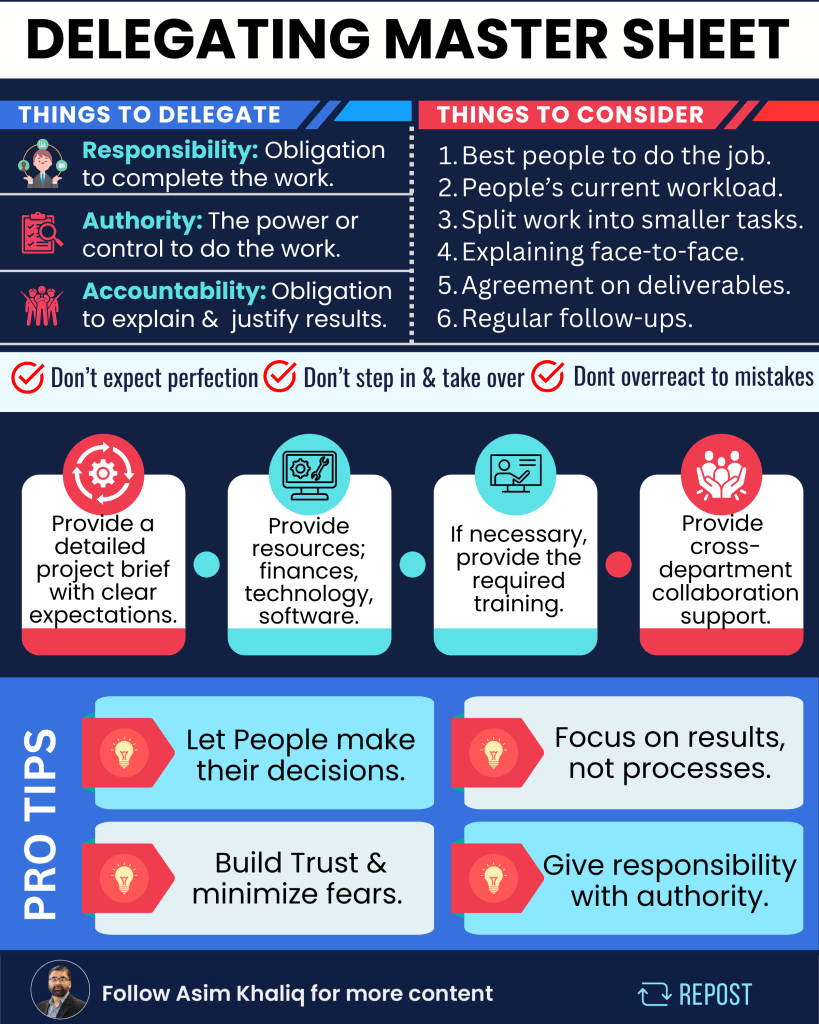
Delegating Master Sheet: Empowering Your Team for Success
Effective leadership and management, delegation stands as a cornerstone. Delegation is not merely about assigning tasks; it’s about empowering individuals within your team to take ownership, exercise their skills, and contribute meaningfully to collective goals. In this comprehensive guide, we delve into the intricacies of delegation, exploring the fundamental aspects, considerations, and pro tips to master the art of delegation. principles of storytelling, equipping you with the tools to craft narratives that leave a mark.
At the core of successful delegation lies a deep understanding of three key elements: responsibility, authority, and accountability. Responsibility refers to the obligation to complete the work, while authority is the power or control to execute that work. Accountability, however, remains with the delegator – the responsibility to explain and justify the results.
Effective delegation begins with a thoughtful assessment of the individuals best suited for the task. Considering their current workload, skill sets, and growth potential is essential. Splitting larger projects into smaller, manageable tasks also facilitates the delegation process, allowing team members to take ownership of specific components.
Face-to-face communication is paramount when delegating tasks. It provides an opportunity to explain expectations clearly, align on deliverables, and address any potential roadblocks or concerns. Regular follow-ups and open lines of communication further reinforce the commitment to success and foster a collaborative environment.

Tell your story as if you're telling it to a friend.
Delegation revolves around three key components:
- Responsibility: This entails the obligation to complete the assigned work.
- Authority: The power or control granted to individuals to execute the delegated tasks.
- Accountability: Individuals are obligated to explain and justify the outcomes of their actions.
Things to Delegate
Delegating effectively requires a strategic approach. Here are the crucial elements to consider:
- Identifying the Best People for the Job
Delegate tasks to individuals with the requisite skills, knowledge, and expertise.
- Assessing People’s Current Workload
Avoid overburdening individuals by considering their existing commitments and workload.
- Breaking Down Tasks into Smaller Components
Divide complex projects into manageable chunks to facilitate better understanding and execution.
- Ensuring Clear Communication
Explain tasks and expectations clearly through face-to-face interactions to minimize misunderstandings.
- Establishing Agreements on Deliverables
Ensure mutual understanding and agreement on project deliverables and timelines.
- Maintaining Regular Follow-Ups
Stay engaged with the progress of delegated tasks through consistent follow-up meetings or updates.
Important Considerations Before Delegation
Successful delegation requires attention to detail and effective management practices. Here are some critical considerations:
Don’t Expect Perfection
Acknowledge that mistakes may occur and focus on continuous improvement rather than perfection.
Avoid Micromanagement
Resist the urge to intervene excessively; trust your team to deliver results.
Manage Mistakes Wisely
Reacting disproportionately to errors can undermine team morale and hinder productivity.
You might Like these blogs
Providing Support and Resources
To facilitate successful delegation, provide the necessary resources and support:
- Clear Project Briefs
Offer detailed project briefs outlining expectations, objectives, and guidelines.
- Access to Resources
Provide access to financial resources, technology, and required software for task execution.
- Training and Development
Offer training sessions or resources to enhance individuals’ skills and capabilities.
- Cross-Departmental Coordination
Facilitate collaboration an
Pro Tips for Effective Delegation
Mastering the art of delegation requires finesse and strategic thinking. Here are some expert tips:
Let People Make Decisions
Empower your team members to make decisions within their delegated roles, fostering autonomy and ownership.
Focus on Results
Shift the focus from micromanaging processes to achieving desired outcomes and results.
Build Trust
Cultivate a culture of Trust within your team, minimizing fears and encouraging open communication.
Delegate Responsibility with Authority
Grant individuals the authority they need to fulfill their delegated responsibilities effectively.
Conclusion
Delegation is not just a managerial task; it’s a leadership skill that fosters growth, empowerment, and collaboration within teams. By mastering the art of delegation, leaders can unlock the full potential of their team members, drive productivity, and achieve collective success.
Mastering the art of delegation is not merely a management technique; it’s a pathway to empowerment, growth, and collective success.
FAQs.
Assess tasks based on complexity, urgency, and individual team members’ skills and workload. Delegate tasks that align with individuals’ capabilities and developmental goals.
In such cases, provide constructive feedback, identify areas for improvement, and offer necessary support or resources to ensure successful task completion in the future.
Start by delegating smaller, less critical tasks and gradually increase the level of responsibility as Trust and confidence in your team members grow. Effective communication and clarity regarding expectations can also alleviate concerns.
Effective delegation does not equate to relinquishing control entirely. Maintain oversight through regular check-ins and updates while allowing individuals the autonomy to execute tasks within defined parameters.
Absolutely. Delegation provides opportunities for skill enhancement, growth, and leadership development. Leaders can nurture talent and promote career advancement within their teams by delegating tasks aligned with individuals’ strengths and interests.




